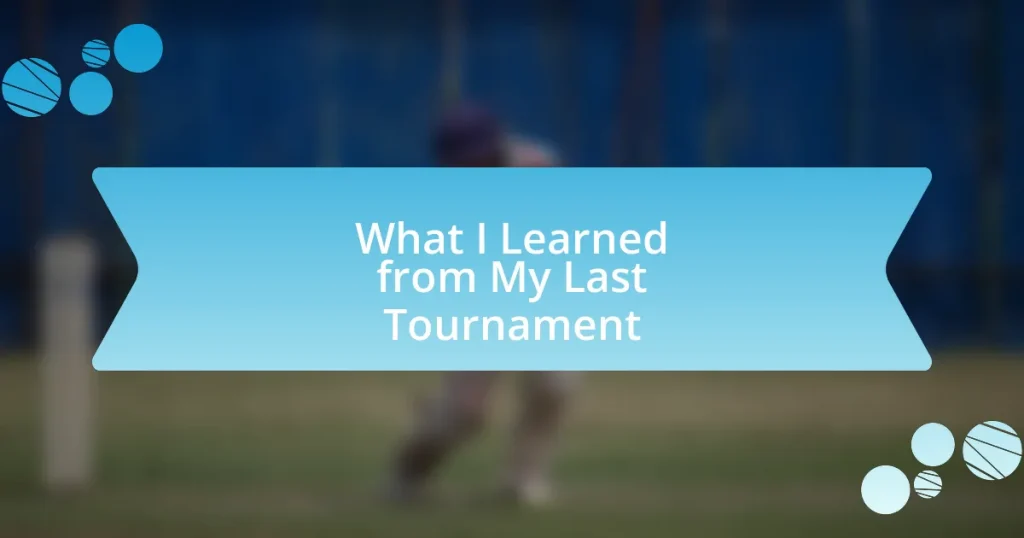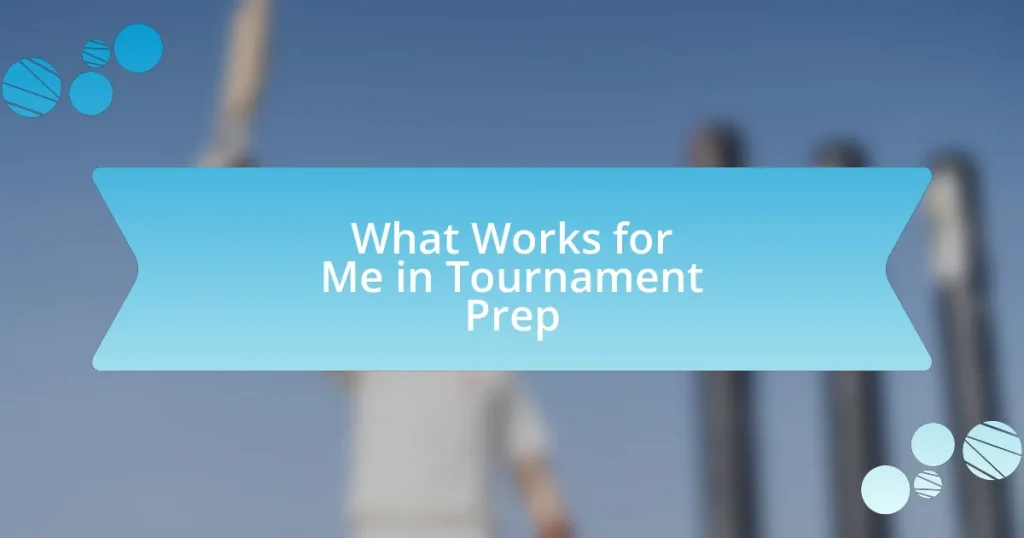Key takeaways:
- Key strategies for success included pre-match visualization, setting incremental goals, and active adaptability during matches.
- Facing challenges such as performance pressure, adapting to opponents, and managing fatigue enhanced resilience and mental toughness.
- Effective communication and teamwork were crucial for navigating challenges and boosting overall performance.
- Mental preparation and adaptability to unexpected situations significantly influenced outcomes in competitive settings.
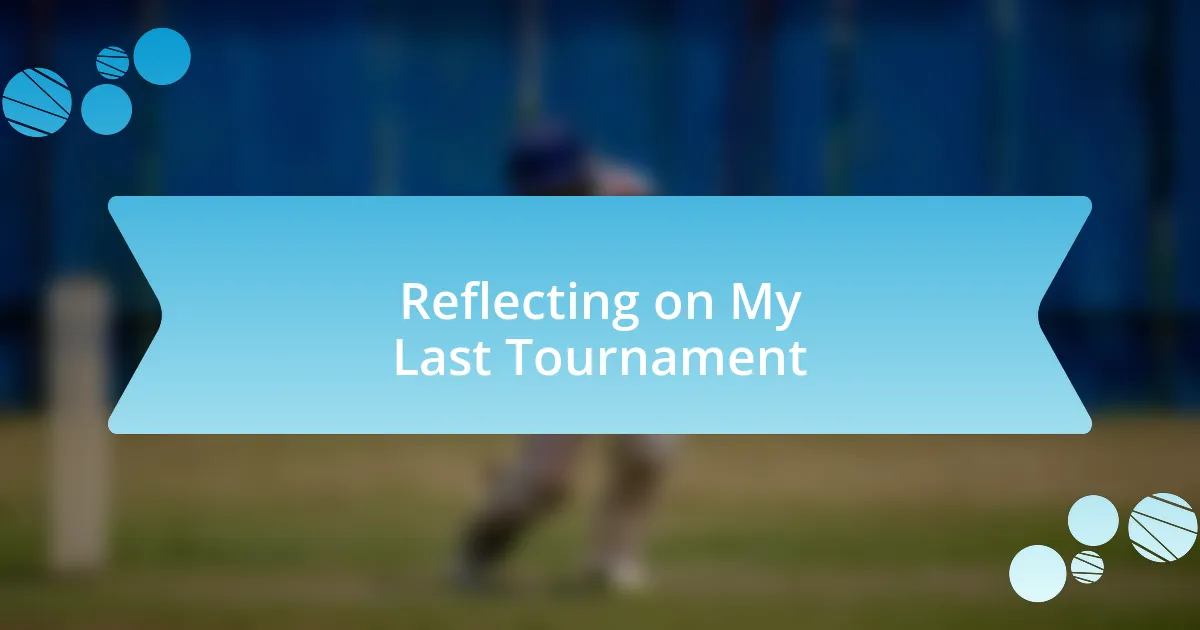
Reflecting on My Last Tournament
Reflecting on my last tournament brings a mixture of pride and lessons learned. I remember the adrenaline pounding in my chest as I faced my first match; it was exhilarating yet nerve-wracking. Had I prepared enough? Those moments of self-doubt crept in, but I quickly reminded myself of the countless hours of training I’d put in.
As I think back, the most humbling experience was losing in the semifinals. It felt like my heart dropped into my stomach, but rather than wallowing, I asked myself, “What can I take away from this?” I realized that each setback is an opportunity for growth. In that moment, I found gratitude for the chance to learn from my opponents and refine my skills.
Another vivid memory is the camaraderie shared with my teammates. The laughter and encouragement during tough matches were invaluable. It made me reflect on how vital support is in competitive environments. Have you ever felt that spark of teamwork lift you up when you were down? It’s incredible how shared experiences can bolster resilience and motivation.
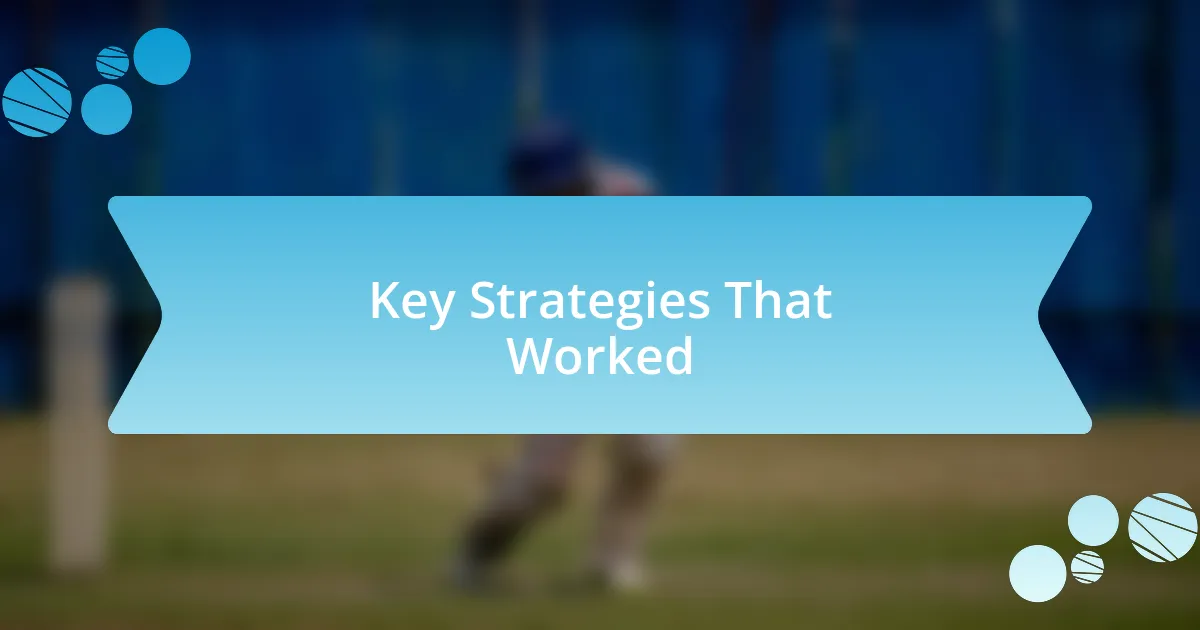
Key Strategies That Worked
When I think of the strategies that truly made a difference in my performance, several key elements stand out. One strategy that worked well was visualization. Before each match, I took a few moments to vividly imagine my gameplay, picturing every move and outcome. This practice not only calmed my nerves but also created a mental framework that guided my actions on the court.
Here are the key strategies that helped me excel:
- Pre-match Visualization: I visualized every step, which sharpened my focus and reduced anxiety.
- Setting Incremental Goals: Instead of fixating on winning, I focused on small milestones within each match, which kept my motivation high.
- Active Adaptability: I learned to quickly adjust my tactics based on my opponent’s style, turning potential challenges into opportunities for growth.
During one particularly intense match, I found myself trailing behind. Instead of panicking, I remembered to breathe and reassess my gameplay. This adaptability not only shifted my mindset but also led to a remarkable comeback. Embracing flexibility in my approach transformed what could have been a defeat into a thrilling victory.
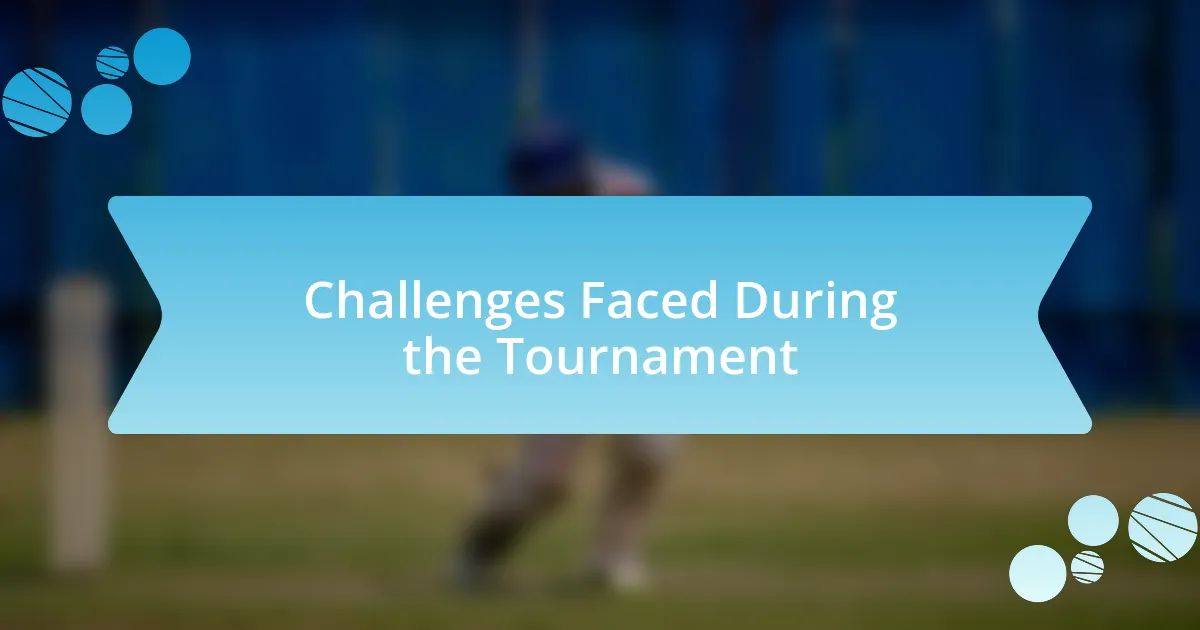
Challenges Faced During the Tournament
Facing challenges during the tournament was quite the rollercoaster. One challenge I encountered was the overwhelming pressure of performing in front of a crowd. In moments of tension, I felt my heart racing and my palms sweating, which made concentration difficult. I vividly recall a match where, despite practicing hard, I struggled to execute my moves as nerves gripped me.
Another hurdle was adapting to different playing styles. Each opponent had unique strategies that required quick thinking and adjustments. I remember facing a player whose aggressive style took me by surprise. It was a moment where I had to dig deep, reevaluate my approach, and find a way to counter their intensity. It was exhausting but ultimately rewarding when I found my rhythm.
Lastly, fatigue set in as the days of competition wore on. After several matches, I felt physically drained and mentally foggy. I distinctly remember wanting to throw in the towel during a particularly long day, but I learned that overcoming this mental barrier is part of the journey. Pushing through fatigue helped me build resilience and strengthened my resolve for future challenges.
| Challenges | Emotional Responses |
|---|---|
| Performance Pressure | Nervousness and Anxiety |
| Adapting to Opponents | Surprise and Overwhelm |
| Physical Fatigue | Frustration and Determination |
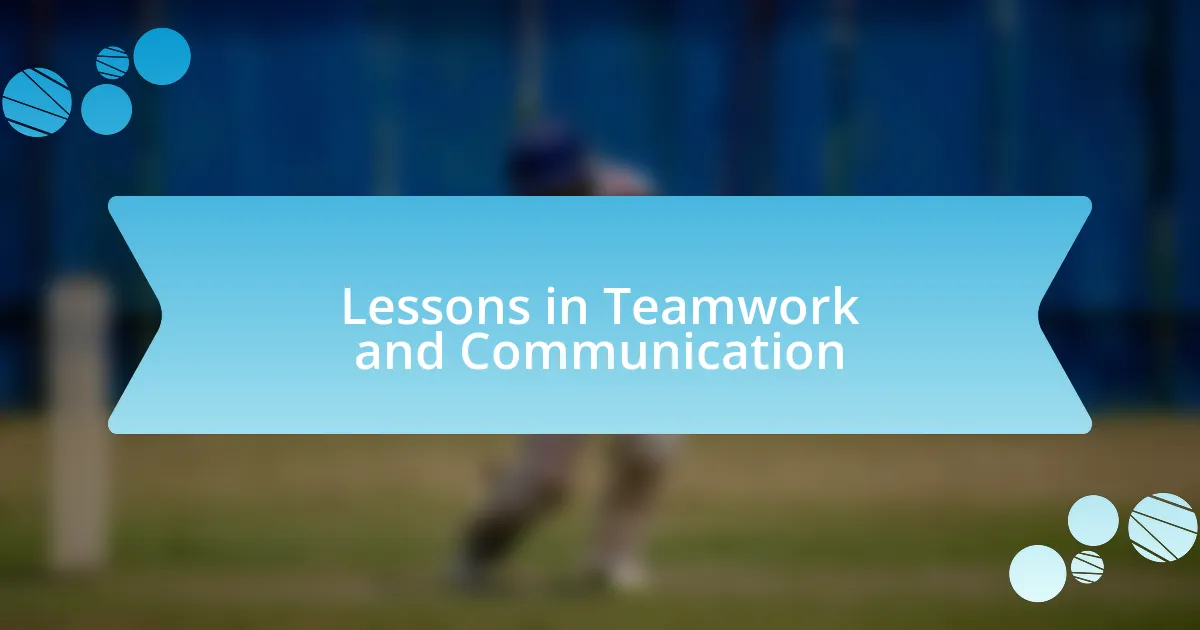
Lessons in Teamwork and Communication
Communication is essential in a team setting, and I learned this the hard way during the tournament. There was a moment when we were strategizing just before a crucial match, and I realized that I had completely misunderstood my teammate’s signals. I remember the frustration that washed over me when I missed a critical play, leading us to lose the game. It made me appreciate how transparent and clear communication can alter the outcome of a match.
Reflecting on my experiences, I also discovered that teamwork involves more than just sharing the workload. There was a game where we were all feeling the weight of fatigue; instead of pushing through in silence, we took a moment to rally together. I felt an incredible surge of energy when we voiced our concerns and reminded each other of our shared goals. It was a real eye-opener that lifting one another up can make a world of difference in performance.
Have you ever felt like your instincts were off because you weren’t in sync with your team? I found that each player’s vibe affects the group’s overall energy. After a particularly heated discussion with a teammate, we set aside our differences and learned to appreciate our unique strengths. This moment underscored the power of active listening and compromise, which transformed our group dynamic and helped us build a more cohesive unit.
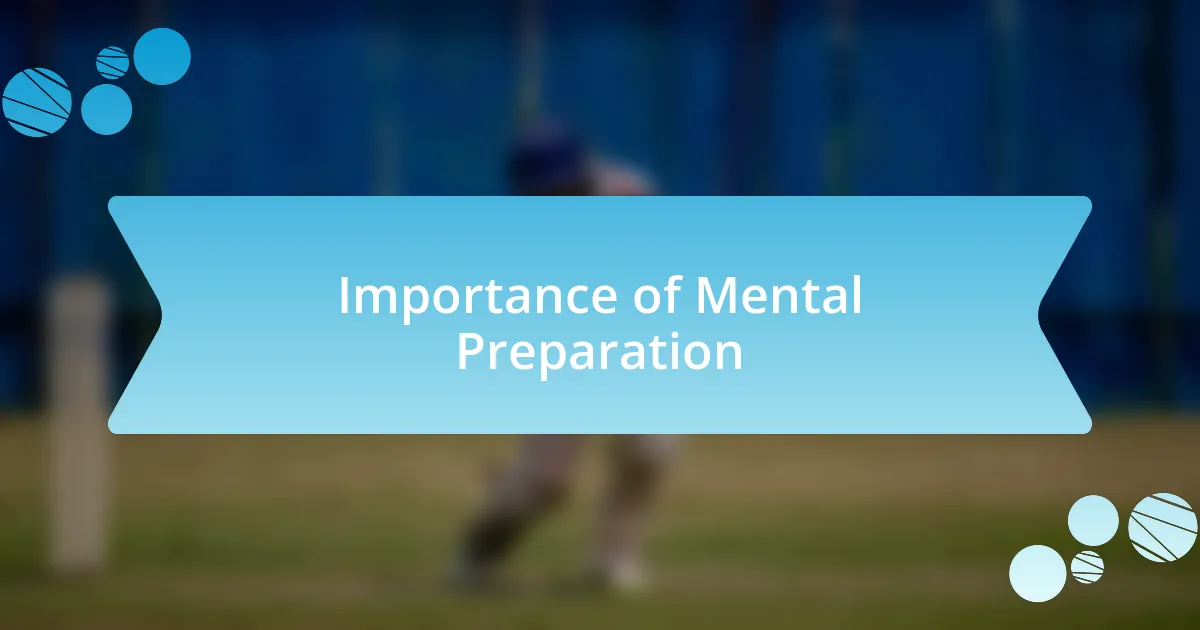
Importance of Mental Preparation
Preparing mentally for a tournament can make all the difference in performance. I still remember the pre-tournament anxiety that crept in, causing me to second-guess my abilities. The moment I took the time to visualize my plays and affirm my strengths, I felt a wave of calm wash over me. It was as if I had flipped a switch; my confidence surged right before I stepped onto the field.
In another instance, when faced with a tight match, I found myself relying on deep breathing exercises I had practiced. Each breath grounded me, allowing me to focus on the task instead of the pressure surrounding me. This experience taught me that mental preparation isn’t just about getting in the right headspace but also about having tools ready to manage stress when it arises.
Have you ever entered a game feeling scattered and overwhelmed? I can certainly relate. It was in a high-stakes match where I neglected my mental routine that I struggled the most. That day underscored the power of consistency in mental prep. I now believe that mental training should be treated with the same seriousness as physical training; both are integral to winning.
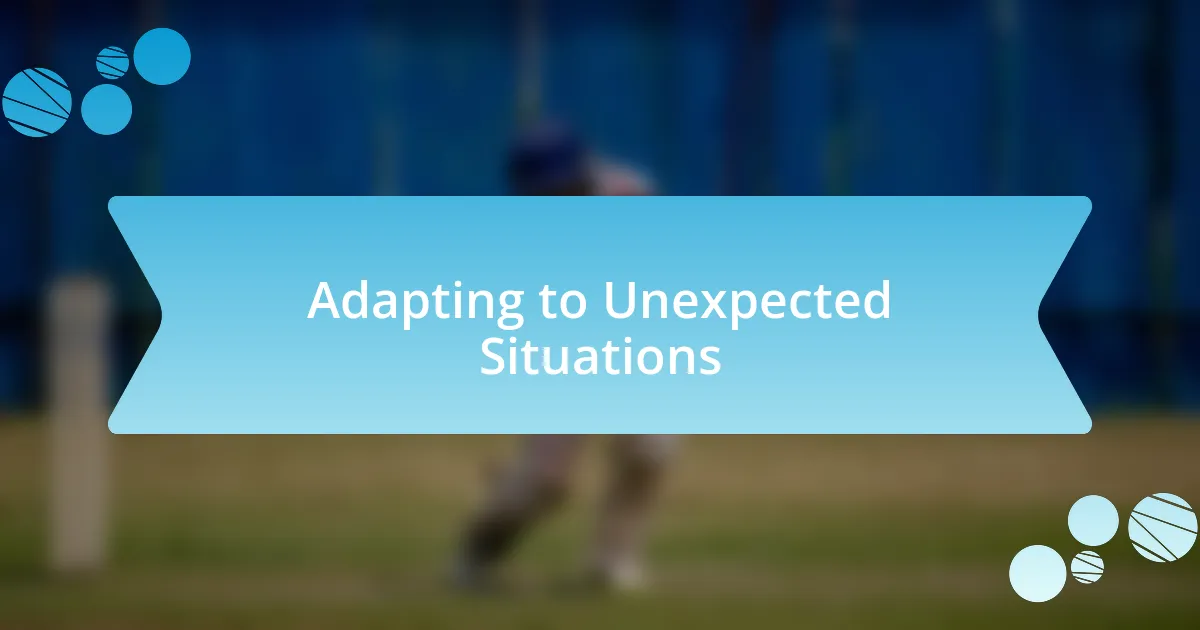
Adapting to Unexpected Situations
When a surprising turn of events occurs during a tournament, adaptability becomes critical. I vividly recall one instance when a sudden rule change was announced just before my match. Initially, I felt a surge of frustration, but instead of dwelling on it, I quickly reminded myself that every athlete faces unforeseen challenges. It pushed me to reassess my strategy on the fly, and to my surprise, I found an innovative solution that ultimately worked in my favor.
There was another time when a key player on my team was sidelined due to an injury right before our game. Rather than freaking out, we gathered as a team to discuss our options. It became an opportunity for someone else to shine, and watching my teammate step up showcased not only our resilience but also the power of collective support. This taught me that being flexible in the face of adversity can reveal strengths I didn’t know existed within the team.
In those moments, I learned that how I respond to the unexpected is just as crucial as the preparation leading up to the event. Have you ever found yourself thrown off balance by an unanticipated situation? I know I have. It’s a reminder that the mental agility to pivot quickly can transform setbacks into opportunities, ultimately shaping a more well-rounded athlete.
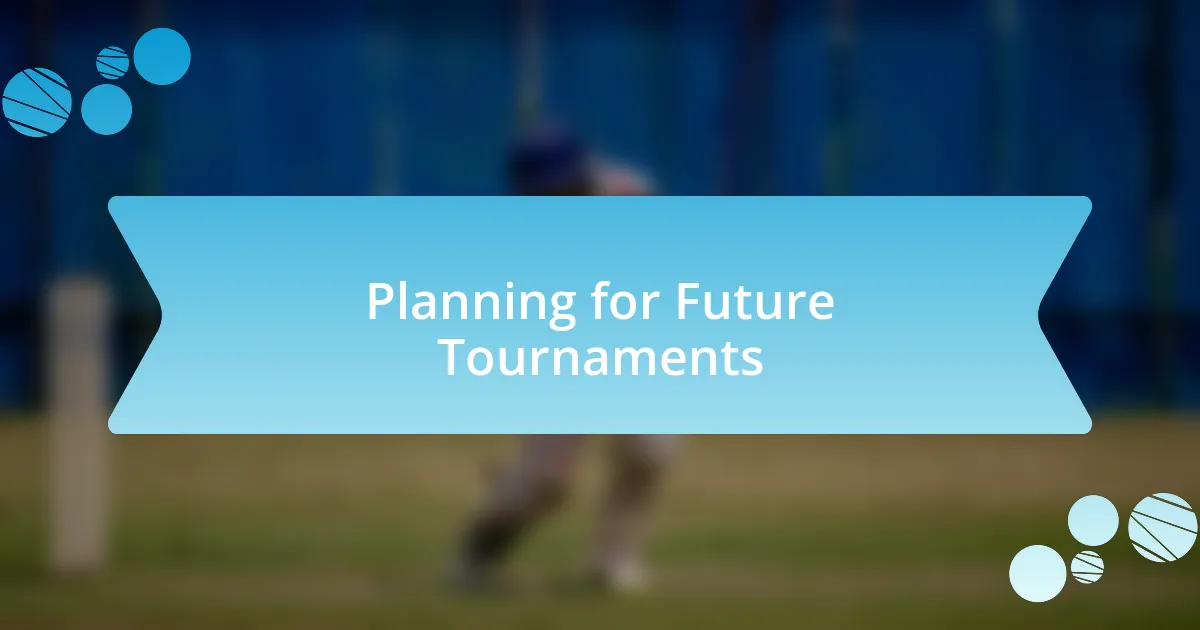
Planning for Future Tournaments
When I think about planning for future tournaments, I realize how crucial it is to create a comprehensive strategy. For instance, after my last tournament, I sat down and analyzed not just my performance, but also how our team prepared beforehand. This reflection made me understand that we need to establish clear roles within the team, ensuring everyone knows where to focus their energy and how to support each other effectively.
Another vital aspect I’ve learned is the importance of physical and mental conditioning leading up to the event. I remember the exhaustion I felt during my matches when I hadn’t prioritized rest and recovery. It’s eye-opening to recognize that even the best strategies can falter if I’m not in peak condition. How can we expect to perform well if we are not fueled and ready? This question drives me to create a balanced training regimen that fosters both physical strength and mental resilience.
Lastly, developing a plan for evaluating our performances post-tournament has become a priority for me. Last time, I neglected to debrief with my teammates right after the event, and it was only afterward that I realized how many insights we missed out on sharing. Moving forward, I intend to schedule a reflective session where we can openly discuss what worked, what didn’t, and how we can better prepare for future competitions. This not only helps in building camaraderie but ensures that we are all aligned in our growth as athletes.










